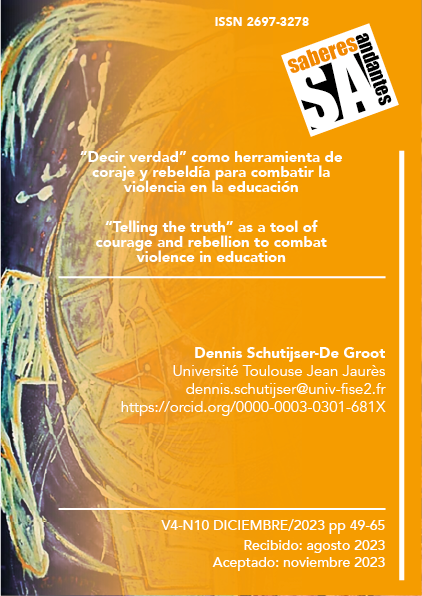Truth-speaking as a tool to reinsert violence into education
Keywords:
Freire, Foucault, violencia, verdad, parresia, diálogo, corajeAbstract
Contrary to the common opinion which seeks to condemn violence in education and promote a state of peace, education is not violent enough when it does not allow for an interrogation of the systemic and symbolic dimension of violence. The concept of parresía or truth-speaking, coined by Michel Foucault, constitutes a useful tool to reinsert a necessary element of violence into education. It serves to break with the implicit presuppositions in a philosophy of education that seeks to establish a state of peace by focusing its attention on the relation between words and things on the one hand, and by diverting attention from the lived opposition between committed individuals on the other hand. Parresía links the speaker’s commitment, the appeal to the interlocutor, and the encompassing reality of the relationship between them. It can thus give a new direction to philosophy of education in the Latin American context consisting in creating a space of freedom to speak truths. However, this proposal is not without its difficulties, and it notably contains at least two paradoxes for further study and confrontation. The first is that the educator is required at the same time to mobilize their students to commit to speaking their truths, and to be an object of critique in those truths. The second is that speaking truthfully is at the same time a constant exercise in critique of the other, and a creative work of oneself, albeit without a fixed objective.
Downloads
References
Austin, J.L. (1990). Como hacer cosas con palabras. Barcelona: Paidós.
Dewey, J. (2007). Cómo pensamos. Barcelona: Paidós.
Flakin, N. (28 de septiembre de 2020). Their violence and ours. Hampton
Institute. https://www.hamptonthink.org/read/their-violence-andours
Foucault, M. (2010). El coraje de la verdad: el gobierno de sí y de los
otros II. México: Fondo de Cultura Económica.
Foucault, M. (2004). Discurso y verdad en la antigua Grecia. Barcelona:
Paidós.
Foucault, M. (2002). Vigilar y castigar. Buenos Aires: Siglo XXI.
Freire, P. (2012). Pedagogía del oprimido. Madrid: Siglo XXI.
Freire, P. (1976). La educación como práctica de la libertad. Madrid: Siglo
XXI.
González, M. (2015). Las escuelas clandestinas en Ecuador. Raíces de
la educación indígena intercultural. Revista Colombiana de
Educación No.69, Julio/Diciembre, 75-95.
Ley Orgánica de Educación Intercultural (LOEI) de 2015 Ecuador.
Lipman, M. et.al. (1992). La filosofía en el aula. Madrid: Ediciones de la
Torre.
López, J. (2019). Transversalidad de género o ideología de género:
caso Ecuador. Analysis. Claves de Pensamiento Contemporáneo
Vol.24, 163-171.
Lyotard, J. (1983). Le différend. Paris: Éditions de Minuit.
Organización Panamericana de la Salud (2002). Informe mundial sobre la
violencia y la salud: resumen. Washington: Organización Mundial
de la Salud (OMS).
UNESCO. (2011). La filosofía una escuela de la libertad. París: UNESCO
Paillacho, C. (2019). Las limitaciones para abordar la violencia entre
estudiantes: un acercamiento desde los educadores y educadoras.
Saberes Andantes 2(6), 41-54.
Prairat, E. (2019). Propos sur l’enseignement. Paris: PUF.
Wittgenstein, L. (1999). Investigaciones filosóficas. Barcelona: Altaya.
X, Malcolm. (1963). Mensaje a las bases. Conferencia Norteña de Líderes
de Base Negros. Detroit. https://www.marxists.org/espanol/
malcolm_x/obras/1963/nov/10.htm.
Zizek, S. (2009). Sobre la violencia. Buenos Aires: Paidós.

Published
How to Cite
Issue
Section
License
Copyright (c) 2023 Dennis Schutijser

This work is licensed under a Creative Commons Attribution-NonCommercial-ShareAlike 4.0 International License.
1. Derechos de autor
Las obras que se publican en Saberes Andantes están sujetas a los siguientes términos:
1.1. Saberes Andantes, conserva los derechos patrimoniales (copyright) de las obras publicadas, favorece y permite la reutilización de las mismas bajo la licencia Licencia Creative Commons 4.0 de Reconocimiento-NoComercial-CompartirIgual 4.0, por lo cual se pueden copiar, usar, difundir, transmitir y exponer públicamente, siempre que:
1.1.a. Se cite la autoría y fuente original de su publicación (revista, editorial, URL).
1.1.b. No se usen para fines comerciales u onerosos.
1.1.c. Se mencione la existencia y especificaciones de esta licencia de uso.








